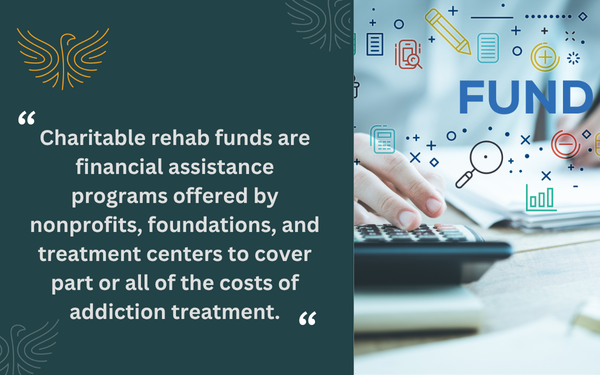The decision to seek treatment takes incredible courage, but for many, that courage collides with a harsh reality involving rehab costs. Yet, charitable funds, nonprofit organizations, and community programs exist specifically to bridge this gap, making recovery accessible regardless of your bank account balance.
Below, we take a closer look at what charitable rehab funding means, where to find it, and most importantly, how to successfully access it.
_______________________________________________________
What Are Charitable Rehab Funds?
Charitable rehab funds are financial assistance programs offered by nonprofits, foundations, and treatment centers to cover part or all of the costs of addiction treatment. These aren’t loans you’ll need to repay, but investments in your recovery made by people and organizations who understand that healing shouldn’t depend on wealth.

These funds take several forms, each designed to meet different needs, such as:
- Grants: Provide direct financial assistance for treatment and do not require repayment.
- Scholarships: Often awarded based on financial need, recovery commitment, or specific demographics (such as veterans, women, or young adults). These cover part or all of treatment costs for qualifying applicants.
- Donor-supported beds: Some treatment centers reserve no-cost or reduced-cost spots for individuals who can’t afford care but are ready to commit to recovery.
It's important to note that these funds typically go directly to treatment facilities rather than to individuals. This ensures accountability and that donations are used specifically for treatment.
Ultimately, these programs exist to expand access to care, not to judge your circumstances or exclude you based on past mistakes. Their mission is simply to remove financial barriers that prevent people from getting the help they need.
_______________________________________________________
Common Types of Charitable Assistance Programs
Common types of charitable assistance programs include:
- Treatment center–sponsored scholarships: Many rehab facilities set aside annual budgets for partial or full scholarships.
- Faith-based programs: Churches, temples, and ministries often fund treatment placements through religious or community grants. For instance, the Salvation Army Adult Rehabilitation Centers provide free, comprehensive programs nationwide, open to people of all faiths.
- National nonprofit foundations: Organizations, such as 10,000 Beds, offer grants and scholarships that make rehab more accessible.
- Local and community foundations: Many regional health or wellness foundations offer vouchers or stipends for outpatient or detox services within your local area.
- Employer-supported initiatives: Some workplaces partner with treatment centers or match charitable contributions toward employee recovery programs—an option worth asking about if you’re currently employed.
_______________________________________________________
How to Apply
When you’re ready, here’s how to find charitable rehab funds in your area.
Step 1: Clarify Your Treatment Needs
Start by defining what type of care you require—detox, residential treatment, intensive outpatient programs (IOP), or ongoing therapy. Think about your preferred location, timeline, and whether you’ll need medication-assisted treatment (MAT).
If possible, ask a counselor or healthcare provider to document your diagnosis and the medical necessity of treatment. This confirmation will strengthen your funding applications.
Step 2: Build a Target List
Research all possible sources of charitable funding. Google can be a great resource here. But you can also call 211, a free national helpline that connects you with local assistance programs.
Step 3: Confirm Eligibility
Once you’ve identified promising options, review the eligibility criteria carefully. Some programs cover only specific substances, treatment levels, or geographic areas. Others may prioritize applicants with limited insurance coverage or certain income thresholds.
Verifying these details early saves time and ensures you apply only to programs that truly match your circumstances.
Step 4: Gather Documentation
Before applying, collect all required documents. This usually includes identification, proof of income, tax records or pay stubs, a medical or behavioral health assessment, and a letter verifying your diagnosis or treatment recommendation.
Step 5: Prepare a Strong Application
When completing your applications, clearly express both your financial need and your personal commitment to recovery. Be specific about how treatment will impact your life and why you’re motivated to follow through.
If there’s space for a personal statement, describe your goals and what recovery means to you. Authentic, detailed answers help fund administrators see the value of investing in your treatment.
Step 6: Apply to Multiple Programs
Because charitable funds are often limited and competitive, apply to several programs at once rather than waiting for one response before trying another. Each application increases your chances of securing support and helps you find the best fit for your treatment needs and timeline.
Step 7: Follow Up and Stay Engaged
After submitting your applications, maintain contact with fund administrators. A short, polite follow-up email or phone call shows your seriousness and keeps your application on their radar. Ask about related support, such as transportation vouchers, sober-living assistance, or therapy stipends that might extend your recovery resources.
Step 8: Get Help with the Process
Applying for assistance can feel overwhelming, especially during early recovery. So, don’t hesitate to ask for help from a sponsor, counselor, social worker, or trusted friend. They can help you review forms, gather documents, or stay organized as deadlines approach.
Step 9: Track Your Progress
Keep a simple log of where you’ve applied, whom you’ve contacted, and what materials you’ve submitted. This helps you stay organized, follow up at the right times, and avoid duplicate applications. Even a basic spreadsheet or notebook can make a big difference when juggling multiple opportunities.
Your willingness to get help is already the most valuable contribution to your recovery. Now it’s time to let others join you in that investment. It’s okay to ask for help. And the Freedom Recovery Centers (FRC) team can help guide you through every step in recovery, from detox and beyond. Call us today at 804-635-3746 to take that first step. Whether it’s your first or last time in rehab, we’re not here to judge, and you don’t have to do this alone.
.svg)






.svg)

.svg)



.svg)
